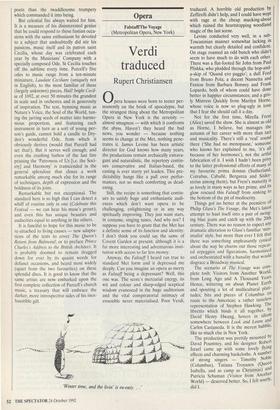Opera
Falstaff/The Voyage (Metropolitan Opera, New York)
Verdi traduced
Rupert Christiansen
Opera houses were born to teeter per- manently on the brink of apocalypse, but the strangest thing about the Metropolitan Opera in New York is the serenity — almost smugness — with which it confronts the abyss. Haven't they heard the bad news, you wonder — because nothing seems to change at the Met, nothing pene- trates it. James Levine has been artistic director for God knows how many years, the productions remain archaically extrava- gant and naturalistic, the repertory contin- ues conservative and Italian-based, the casting is ever starry yet leaden. This pre- dictability hangs like a pall over perfor- mances, not so much comforting as dead- ening.
Still, the recipe is something that contin- ues to satisfy huge and enthusiastic audi- ences which don't want opera to be challenging, enlightening or in any way spiritually improving. They just want stars, in costume, singing tunes. And why not? I suppose you have to grant that the Met has a definite sense of its function and identity: I don't think you could say the same of Covent Garden at present, although it is a far more interesting and adventurous insti- tution with access to far less money.
Anyway, the Falstaff I heard ran true to standard Met form and it depressed me deeply. Can you imagine an opera as merry as Falstaff being a depressant? Well, this one was. The score's mercurial energy, its wit and colour and sharp-edged sceptical wisdom evanesced in the huge auditorium and the vital conspiratorial intimacy of ensemble never materialised. Poor Verdi,
'Winter time, and the livin' is ea-easy. .
traduced. A horrible old production by Zeffirelli didn't help, and I could have wept with rage at the cheap mucking-about which ruined the heartstopping woodland magic of the last scene. Levine conducted very well, in a sub- Toscaninian manner somewhat lacking in warmth but clearly detailed and confident. On stage roamed an odd bunch who didn't seem to have much to do with each other. There was a flat-footed Sir John from Paul Plishka, who plodded through the hop-and
a-skip of `Quand ero paggio'; a dull Ford from Bruno Pola; a decent Nannetta and Fenton from Barbara Bonney and Frank Lopardo, both of whom could have done better in happier circumstances; and a gris- ly Mistress Quickly from Marilyn Horne, whose voice is now so plug-ugly in tone that I fear she should call it a day.
Not for the first time, Mirella Freni
(Alice) saved the show. She is almost as old as Horne, I believe, but manages the autumn of her career with more than tact and musicality. There's still a 'real' sound there (`She had no menopause,' someone who knows her explained to me, 'it's all because of her hormones'), not the artful fabrication of it. I wish I hadn't been privY to the latter professional efforts of many of my favourite prima donnas (Sutherland, Cotrubas, Caballe, Berganza and SOder- strom among them), but Freni's maturity is as lovely in many ways as her prime, and Its glow rescued this Falstaff from sinking to the bottom of the pit of mediocrity.
Things got no better at the premiere of
Philip Glass's The Voyage, the Met's latest attempt to haul itself into a pair of swing- ing blue jeans and catch up with the 20th century. There was no reason to expect anY dramatic alteration to Glass's familiar 'min- imalist' style, but more than ever I felt that there was something unpleasantly cynical about the way he churns out those repeat- ed arpeggios and figurations, harmonised and orchestrated with a banality that would disgrace a Broadway musical.
The scenario of The Voyage was com- plete tosh: Visitors from Another World, from Long Ago and A Thousand Years Hence, wittering on about Planet Earth and spouting a lot of multicultural plati- tudes; bits and pieces of Columbus en route to the Americas; a rather tasteless representation of Stephen Hawking. The libretto which binds it all together,. by David Henry Hwang, hovers in idiom somewhere between Look and Learn and Carlos Castaneda. It is the merest babble, like so much else in New York. The production was prettily mounted by David Pountney, and his designer Robert Israel came up with some lovely flying effects and charming backcloths. A number of strong singers — Timothy Noble (Columbus), Tatiana Troyanos (Queen Isabella, and as camp as Christmas) and Patricia Schuman (Visitor from Another World) — deserved better. So, I felt sourly, did I.


































































 Previous page
Previous page